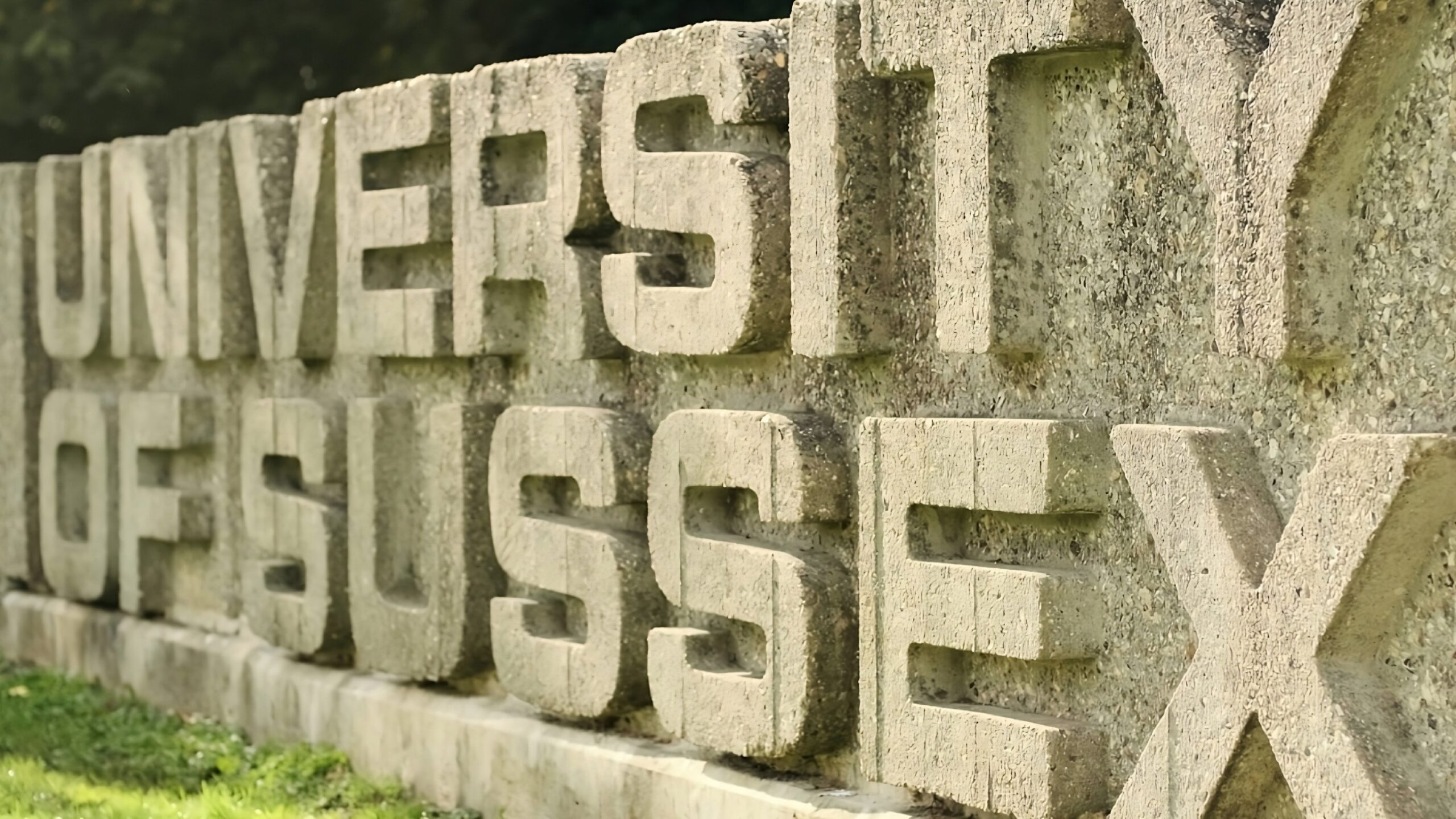The University of Sussex is to be fined a record £585,000 over a failure to uphold free speech and academic freedom.
The Office for Students (OfS) has found “significant and serious breaches” of free speech and governance issues at the University of Sussex.
The regulator’s investigation, which followed the departure of academic Kathleen Stock from the university, says that said policies intended to prevent abuse or harassment of certain groups on campus had created “a chilling effect” that might cause staff and students to “self-censor.”
OfS found that Sussex’s policy statement on “trans and non-binary equality” failed to uphold the principles of freedom of speech and academic freedom governance – and had created a “chilling effect” on campus.
It also said the university failed to have “effective and adequate management and governance arrangements in place” to uphold those principles.
Officially, OfS’ inquiry focused on the university’s general compliance with the regulatory framework, rather than the departure of Kathleen Stock specifically – but also found “no evidence to suggest that Professor Stock’s speech during her employment at the university was unlawful.”
Sussex has come out fighting. Vice chancellor Sasha Roseneil told the Financial Times that universities are now exposed to regulatory risk if they have policies that protect staff and students from racist, homophobic, antisemitic, anti-Muslim or other abuse, and said the regulator had decreed “free speech absolutism as the fundamental principle” for universities.
She also claims the regulator had “refused to speak to us,” and that the fine imposed was “wholly disproportionate” – arguing the university had defended Stock’s right to pursue her academic work and express her “lawful beliefs.”
The report – some 1,224 days since OfS says it opened the investigation – comes at a tricky time for the government. Its decision first to pause, and then announce an intention to partially repeal the Higher Education (Freedom of Speech) Act, has to some extent been centred on concerns that the Act as passed represented a “hate speech charter” preventing universities from taking steps to protect marginalised groups on campus.
OfS’ decision – notwithstanding that it is one taken in the context of a previous and pre-existing legal framework – will therefore be widely seen as rebuttal of the idea that protection of that sort conflicts with free speech and academic freedom.
But on the other side of that argument is Sussex itself – experiencing OfS’ fifth ever fine, and arguing that OfS’ decision will itself have a chilling effect on efforts to:
…prevent abuse, harassment or bullying, to protect groups subject to harmful propaganda, or to determine that stereotyped assumptions should not be relied upon in the university curriculum.
Kathleen Stock left her post as Professor of Philosophy at the University of Sussex in October 2021, shortly after which the Office for Students (OfS) announced that it had opened an investigation focused on whether or not the university had met its obligations for academic freedom and freedom of speech within the law for all students and staff, whatever their views.
Although Stock and her departure from Sussex has become easily the most-referenced example used to illustrate the need for the Higher Education (Freedom of Speech) Act, it had at that stage only recently completed its run in the Commons – so the investigation opened by OfS was over whether the university had complied with general ongoing conditions E1 and E2 – which, in the original Jo Johnson design, were designed to give regulatory force to the “public interest governance principles” for academic freedom and freedom of speech.
This report outlines how OfS determined breaches of conditions E1 and E2, how penalties were calculated, and raises concerns that the university may have breached broader legal duties on free speech and academic freedom. Here there’s a short background, a look in detail at the report itself, and what it might mean for the campus culture wars in coming years.
Background
In late 2021 at the University of Sussex – a campus with a long history of radical politics – a group of students describing themselves as queer, trans, and non-binary had mounted a campaign calling for Stock’s dismissal.
Responding both to her teaching and books, they claimed she was espousing a “bastardised version of radical feminism that excludes and endangers trans people.” Posters and protests ensued, Stock reported receiving death threats and was advised by police to take safety precautions, and the university’s vice chancellor, Adam Tickell (now at Birmingham) defended Stock’s academic freedom and announced an investigation into the protests.
More than 200 academic philosophers from across the UK went on to sign an open letter supporting Stock’s right to “engage in open and scholarly debate without fear of harassment,” but notably the Sussex branch of the University and College Union (UCU) criticized Tickell’s stance, expressing solidarity with the protesting students and calling for an investigation into “institutional transphobia” at the university.
Stock resigned on 28 October, and in a subsequent radio interview on Woman’s Hour, she denied being transphobic, and explained that her resignation followed attacks from colleagues who opposed her views and who, according to Stock, encouraged an “extreme” response from their students. Stock also said that it was the UCU statement that had “effectively ended” her career at Sussex.
What was novel about the affair is that while there had been quoted incidents of “mobbing,” “cancellation,” and “no platforming,” these had tended to be focused on figures outside of universities, visiting as speakers.
Since the Education Act 1986 had started to require to universities to “take reasonably practicable steps to ensure that freedom of speech within the law is secured for members, students and employees of the establishment and for visiting speakers,” it had been the last of that list that had caused that legislation – and the last of that list that had largely generated skirmishes since.
But when Arif Ahmed – now OfS’ Director for Academic Freedom and Freedom of Speech, then a fellow philosopher at the University of Cambridge – wrote for Index on Censorship in early 2022, he noted a new character to conflict on campus. Ahmed picked up other cases – the 500 students that had petitioned Oxford University to force two professors to include trans women in their research into women’s equality, and the academics that had had talks cancelled at Essex University after they were accused of transphobia.
Not wanting to “anticipate what that inquiry finds,” the article also argued that in principle, there may be academic freedom issues on both sides, including “the right of students (or anyone else) to protest against her” – albeit that:
…we must distinguish peaceful protest in favour of a principle like rights for trans people… harassment and victimisation of an individual aimed at blocking their speech.
That often fraught line – between freedom to speak (and research), and freedom from harm – is both as old as John Stuart Mill’s On Liberty (1859), and one that has dogged the debate about campus culture generally and the Higher Education (Freedom of Speech) Act specifically ever since. Where a regulator might draw the line has been an open question – and the report now illustrates it clearly.
An inspector calls
On 7 October 2021, OfS contacted the university seeking information on what steps it had taken to protect free speech and academic freedom for Kathleen Stock and others with similar views, and how it had assessed whether the incident amounted to harassment based on her gender critical beliefs. After reviewing this and examining relevant policies, it formally launched an investigation on 22 October.
The investigation focused on whether the university had taken reasonably practicable steps to uphold lawful free speech and academic freedom, whether its governance documents complied with OfS public interest principles and legal duties (including under the Equality Act 2010), and whether its policies – particularly those on academic freedom, HR, and EDI – had negatively impacted free expression.
It imposed “cooperation requirements,” reviewed multiple rounds of documentation, and considered policy changes made during the process. Provisional findings were shared in March 2024, and final decisions were made on 14 February 2025 after considering the university’s response.
The first breach – of Condition E1 – concerns the university’s governing documents, and the way in which OfS says they restricted lawful speech – including “gender critical” views, which are protected under the Equality Act 2010.
OfS says this created a chilling effect – discouraging staff and students from expressing certain views. Though not officially about Stock’s case per se, it’s cited as a real-world example – OfS taking the opportunity to remind readers of its role in safeguarding lawful free speech through a viewpoint-neutral, “impartial” approach.
The university first adopted a Trans and Non-Binary Equality Policy Statement in November 2018. On 12 November, a proposal was made to publish it on 20 November – Trans Day of Remembrance. The draft was reviewed by the University Executive Group (UEG) on 13 November, which supported its general direction, but called for further discussion after review by the Equality, Diversity and Inclusion Committee.
Despite this, the UEG held an unscheduled meeting on 14 November 2018, during which it approved the statement for publication on 20 November. No separate minutes were recorded for this meeting. That 2018 version remained in effect when OfS began its investigation in October, and is the main source of the compliance problem.
Some tricky timeline issues ensue which relate to later revisions, and OfS has not yet determined whether one of its identified breaches has extended beyond March of last year.
But essentially, the judgement centres on four aspects of different versions of the university’s policy – which it’s counting here for E1 purposes as one of the university’s governing documents:
- A requirement for “any materials within relevant courses and modules [to] positively represent trans people and trans lives.” OfS refers to this as the Positive Representation Statement throughout its report;
- A statement that “the curriculum shall not rely on or reinforce stereotypical assumptions about trans people”. It refers to this as the Stereotyping Statement;
- A statement that “transphobic propaganda … will not be tolerated.” It refers to this as the Transphobic Propaganda Statement;
- A statement that “transphobic abuse, harassment or bullying (name-calling/derogatory jokes, unacceptable or unwanted behaviour, intrusive questions) are serious disciplinary offences for staff and students and will be dealt with under the appropriate University procedures.” It refers to this as the Disciplinary Statement.
OfS’ conclusion is that the university breached E1 because the four statements breached the academic freedom and freedom of speech principles.
That’s partly because the statements were capable of restricting lawful speech – including in-course content – and signalled that some views weren’t welcome. This, says OfS, produced a chilling effect – Stock self-censored, and others likely did too. She removed lawful material from her curriculum, narrowing academic debate and reducing students’ exposure to diverse views. Other staff may have followed suit or felt pressured to.
Its argument is that the policy lacked safeguards for legally protected beliefs like “gender critical” views and that its other governing documents didn’t fill that gap. The university’s wider “Statute VII” offered some protection for free speech and academic freedom, but in OfS’ view was insufficient.
Partly because the investigation has been on for a long time – and partly because the university has been making changes to policies throughout – there’s also some complex evaluation of what’s happened since the initial investigation opened, all of which is of a similar nature.
See-saw
Much of the material on wider legal duty breaches is focussed on gender critical views as a protected belief – anyone searching for the ways in which OfS might have evaluated efforts to protect trans students just won’t find it.
Hence OfS found no “credible evidence” that the university assessed whether its restrictions on expression under the Trans and Non-Binary Equality Policy Statement were proportionate – a key requirement under Article 10 of the European Convention on Human Rights – that it says raised the risk that the policy’s interferences with freedom of expression were disproportionate and therefore unlawful.
Similarly, OfS was concerned the university may have breached equality law under section 19 of the Equality Act 2010 by indirectly discriminating against individuals with gender critical beliefs – a protected characteristic. The Trans and Non-Binary Equality Policy Statement included provisions (e.g. the Positive Representation, Stereotyping, Transphobic Propaganda, and Disciplinary Statements) that it says restricted lawful speech, including gender critical views. Again, OfS found no credible evidence that the university conducted an objective justification assessment for the restrictions when adopting the policy.
OfS was also concerned that the university may have failed to comply with the Public Sector Equality Duty (PSED). It found no credible evidence that the university properly considered the equality implications of the policy, as required under the PSED, and while the university claimed to have conducted an Equality Impact Assessment for the 2023 version, this appeared limited to the removal of the Positive Representation Statement and did not assess the remaining content.
Taken as a whole, this is a pretty extensive illustration of the principle both in the Higher Education (Freedom of Speech) Act 2023 and OfS’ draft guidance on it – both on “particular regard” to the importance of freedom of speech, and these two notable paras in the draft:
Freedom of speech within the law is protected. Unlawful speech is not protected. However, there is no need to point to a specific legal basis for speech. Instead, the starting point is that speech is permitted unless restricted by law.
Free speech includes lawful speech that may be offensive or hurtful to some. Speech that amounts to unlawful harassment or unlawful incitement to hatred or violence (for instance) does not constitute free speech within the law and is not protected.
There are likely to be debates about the extent to which that was clear to providers in the old regime, and whether the new regime is merely an enforcement wrapper around pre-existing legal duties – but that’s the framing in use in this decision.
A record (reduced) fine
The fining decision is then explained in in line with Regulation 4 of the 2019 Monetary Penalties Regulations, where OfS considered several factors – the nature, seriousness, duration, and impact of the breach; any financial or other benefit the university may have gained or losses it avoided; and whether the breach had been repeated.
OfS assessed that the breach was “serious, prolonged, and had a chilling effect on lawful speech and academic freedom” – and while no direct financial gain was identified, the regulatory failure was significant enough to warrant a monetary penalty to reflect the severity and ensure accountability.
In setting the penalty, OfS also considered steps the university took to prevent future breaches and the likely impact of a monetary penalty on students. A “baseline penalty” was established as per Regulation 4, then adjusted based on aggravating and mitigating factors, including the university’s compliance history. The maximum penalty allowable was either 2 per cent of qualifying income or £500,000, whichever was higher.
For 2023–24, Sussex’s qualifying income was £232,358,874, making the cap £4,647,177. OfS applied its published framework (Regulatory Advice 19) to determine the final penalty, ensuring it was “proportionate, targeted, and justified” in light of the breach’s seriousness and the steps taken by the university since.
The university’s financial position was relevant – with (at the time) substantial income and reserves, OfS concluded that a penalty would not materially harm students. Instead, it would promote future compliance, both at Sussex and, notably, across the sector. The baseline penalty was set at 0.9 per cent of qualifying income: £2,091,230.
Mitigating factors included steps taken by the university to reduce the restrictive effect of its policy like removing the “positive representation” requirement, adding an objective definition of “transphobic abuse,” and including a safeguard for academic freedom in the 2023 policy.
Aggravating factors included the length of the breach (over four years) and the failure to self-report. After applying both sets of factors – each justifying a 0.2 per cent adjustment in opposite directions – the penalty remained unchanged at 0.9 per cent.
The university’s compliance history did not warrant any further adjustment. It cooperated with the investigation and there was no evidence of dishonesty, recklessness, or concealment. Accordingly, after the first three steps of the process, the final penalty for the breach remained £2,091,230.
Governance and delegation
The second breach (Condition E2) was a process one – key policies were adopted by groups lacking the delegated authority to do so. The Prevent Steering Group approved the 2021 Freedom of Speech Code of Practice, the University Executive Group approved the 2023 External Speakers’ Procedure, and also approved the 2022 and 2023 versions of the Trans and Non-Binary Equality Policy Statement – each time acting outside its remit.
These governance failures were deemed significant. Decisions were made by bodies not authorised to take them, raising the risk of insufficient scrutiny or expertise and potentially compromising compliance with legal and regulatory duties. Those failures, found OfS, could result in decisions not in the best interests of staff or students. The breach was not an isolated incident, but part of a pattern suggesting “systemic weaknesses rather than a one-off lapse.”
The university didn’t report the breach to OfS (the old Kafka-esque rules around the reportable events regime), nor has it taken clear steps to address or rectify its governance failures. As such, OfS concluded that its intervention factors supported a breach of condition E2(i), and that regulatory action was necessary to address the university’s ongoing non-compliance with its own governance framework.
This time the baseline penalty was 0.5 per cent of the university’s qualifying income (£1,161,794) for the E2 breach, reflecting its seriousness as a governance failure. While the decisions made without proper authority risked poor quality outcomes, the direct impact on students was assessed as less severe than the E1 breach, and the penalty was also viewed as a means to incentivise future compliance, both at Sussex and across the sector.
Because of aggravating factors – like the longstanding nature of the breach, failure to report it, and lack of remedial steps – the penalty was increased by 0.2 percentage points, bringing it to 0.7 per cent (£1,626,512). No mitigating factors were identified.
As with the E1 breach, the university’s compliance history didn’t affect the penalty, and it had cooperated with the investigation – but OfS ultimately concluded that penalties at the calculated levels would be disproportionately high. And so balancing all considerations – the seriousness of the breaches, financial capacity, cumulative penalty size, and the novelty of regulatory enforcement in this area – OfS reduced the final penalties and imposed £360,000 for the E1 breach and £225,000 for the E2 breach, totalling £585,000.
This was deemed “sufficient” to deter future non-compliance while maintaining financial sustainability. Sussex says the fine is “wholly disproportionate.”
Fallout and next steps
There will doubtless be some fallout from the decision – not least because Sussex is (at least in principle) very publicly criticising the process, the fine, and the judgement made on the EDI/freedom of speech see saw.
In some ways what’s surprising – although on reflection inevitable – is that this wasn’t really an investigation about the Stock affair at all. She and others calling for full implementation of the Higher Education (Freedom of Speech) Act may well argue that the investigation ought to have handled how she was treated, how she was protected (or otherwise) by the university, and drawn conclusions about the handling of events leading to her departure. OfS may well argue – campaigners almost certainly will – that that would only have been possible under the Higher Education (Freedom of Speech) Act.
There are real questions over how long the process has taken, that are not substantially addressed or answered in the report – and the huge fine imposed. That OfS is able to follow the logic of its own documents is one thing, but when compared against some of the teaching and learning investigations it’s done so far, either those providers are in for huge fines, or inevitable comparisons are going to be drawn about relative impact.
There will also be questions about Arif Ahmed himself. The report dots the Is and crosses the Ts as we would expect it to – and includes the “neutrality” defence we’ve come to recognise. But even though he’s unlikely to have been personally involved in this process, we should be reminded of the OIA’s advice that providers need to take steps to avoid “actual bias and the reasonable perception of bias” when handling complaints. Given in a previous role that Index on Censorship blog was entitled “We academics must fight the mob – now”, it’s not hard to see why some might at least perceive an agenda.
The other questions surround the jurisprudence. It remains the case that in the cases we’ve seen, different levels of protection for freedom of speech apply in different contexts – there’s no doubt that in a lecture hall or seminar room, the way the Human Rights Act is applied is different to during someone’s personal life, free time, and so on. There’s nothing in here on the different contexts of conduct that a “university” encompasses – and it remains a hole in what OfS has published so far, and arguably in the way it has evaluated the policies for the breaches.
The practical compatibility of the decision with impending heavy duties on harassment will also be a concern – with frantic rewrites of policies similar in nature and tone to that adopted by Sussex likely to face pushback from those who fear a wider retreat from equality-focussed work.
It’s the government, though, that faces the trickiest set of decisions from here on in. Its decision to pause and intent to soften somewhat the Act has all been about a perception that it was to result in free speech absolutism at the expense of the protection of minorities.
It may be a reflection of the law or a very particular (and contestable) interpretation of it – and legal challenges may ensue – but if nothing else, it’s hard to see how the version of “absolutism” deployed here is compatible with (for example) the IHRA definition of antisemitism – something successive governments have consistently supported, and which Ahmed himself only changed position on when taking up his role.
Notwithstanding that Labour has disappointed trans campaigners since taking office, it will now have to decide whether Sussex is right that universities are now “exposed to regulatory risk if they have policies that protect staff and students from racist, homophobic, antisemitic, anti-Muslim or other abuse.” And if they are, whether the problem is the Higher Education (Freedom of Speech) Act, the Human Rights Act, or Arif Ahmed himself.










